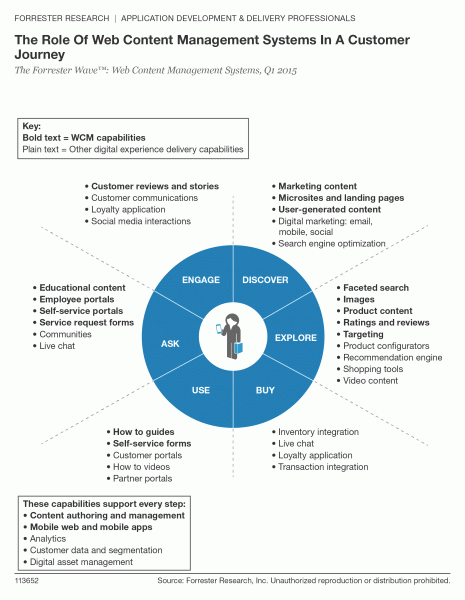Pick The Right Web Content Management System — It’s The Backbone Of Your Digital Experiences
With 25 years of history and 178 million active public websites around the world, you would think that the backbone technology for websites would be mature, sophisticated, basically done as a market. But it's simply not true. Web content management (WCM) systems are still in their infancy. Here's the one-minute history:
- 1995. These ever-changing systems first had to learn to deliver content interactively, tailoring the experience to the needs of the day. Think Yahoo.com.
- 2000. Then they had to deliver business services directly into customers' hands. Think eBusiness.
- 2010. Then they had to deliver experiences on smartphones and tablets. Think Google Maps app.
- 2015. And now they have to deliver highly personal digital experiences on any device directly into a customer's immediate context and moments of need along every step of her journey (see Figure 1).
- 2020. What's coming next? Well, let's get the platforms up to 2015 requirements first. But those of you with a future slant need to be thinking about modern app architectures, where the building blocks — content systems, digital insights, customer databases, integration, delivery tier, and so on are decoupled to handle IoT, glanceable moments on wearables, and a gazillion other digital scenarios.
Figure 1 Web Content Management Plays A Vital Role In Digital Experiences Across A Customer's Journey

The Bar Just Keeps Going Up
The bar just keeps going up for what web content management systems must do.
Customers keep demanding more — more mobile moments, more personalization, more performance, and more support across every step of their journey. And that means this market is in constant flux, with new vendors offering modern open architectures compete along side stalwart vendors re-inventing themselves in the cloud.
So picking the right web content management system, the best backbone for your digital experiences, is more important than ever. We rolled up our sleeves last fall and worked with 27 vendors and 37 enterprises to define the future of web content management, then assessed the 10 biggest products against a rigorous set of 29 factors defining current offering, strategy, and market presence.
Here's a list of the 10 WCM products we evaluated in the Forrester Wave(tm): Web Content Management Systems, Q1 2015, available to Forrester clients: Acquia, Adobe, Ektron (now part of EPiServer), EPiServer, HP, IBM, OpenText, Oracle, SDL, and Sitecore.
And here are other 17 vendors we track: Alfresco, Automattic, Backbase, Bridgeline, Contentful, CoreMedia, Crafter Software, CrownPeak, DNN Software, e-Spirit, eZ Systems, GX Software, Hippo, Jahia, Kentico, Liferay, Magnolia, Microsoft, Percussion, Telerik, and Upland Software.
Ask Six Questions To Start Your Selection Process
You'll have to call us up to see the evaluation, but in the meantime, when you are making a decision on this vital piece of platform infrastructure, be sure to ask six questions (for clients, we suggest nine other questions):
- Who is the primary audience for the experience? Consumers, business customers, partners, and employees all use web and mobile tools. Define your audience(s) to narrow your search.
- Will you focus on mobile web or mobile apps or both? Most WCM solutions offer mobile web using responsive web design techniques. Few have histories or deep support for mobile apps.
- Are you ready to deploy software in the cloud? The WCM market has been slow to move to a full multitenant cloud (unlike many marketing and some commerce applications). But most solutions run in a single-tenant PaaS and some have a multitenant SaaS offering.
- How many business practitioners will touch this system? Some vendors have made the business and marketing practitioner experience a priority. Most have much work to do here.
- What digital assets and rich media feed your digital experience? All WCM vendors support images and video. Only a few offer a robust independent digital asset management solution.
- Will you need to work with a partner? Most WCM vendors work with agencies and implementation partners to help customers. Some vendors do better with partners than others.
